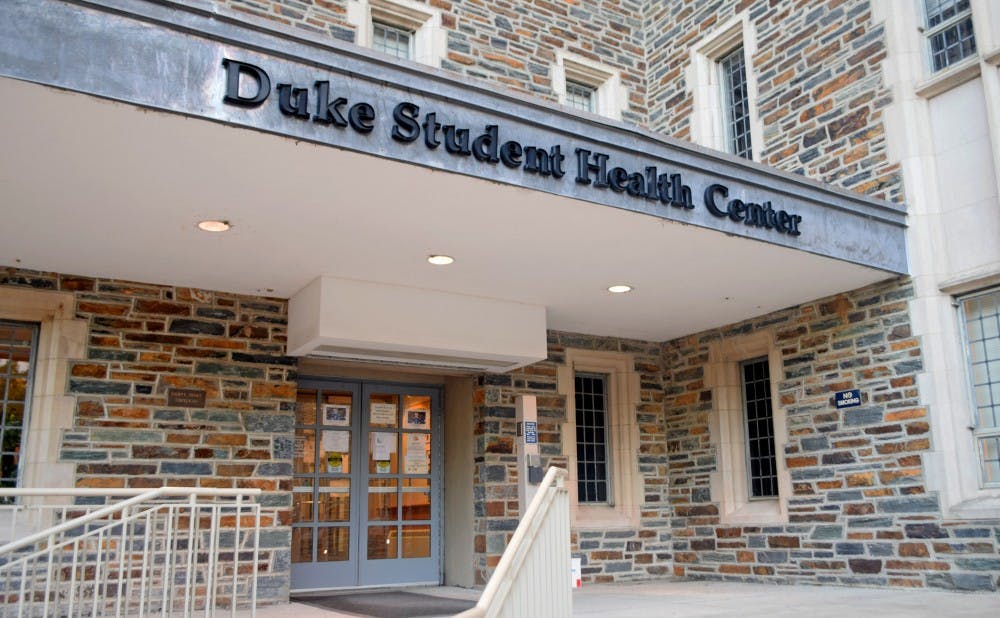This winter will mark Duke's first cold and flu season since the 1990s with all student health services in one location—and some students are expressing concern about whether Student Health can accommodate everyone.
Duke closed its East Campus Student Health location after the Fall 2013 semester, bringing its services to the West Campus location. As more students seek out medical care at the clinic as autumn sets in, some have expressed dissatisfaction with appointment scheduling. Student Health clinic's location in the Davison building and limited hours have also elicited criticism. John Vaughn, director of Student Health, acknowledged issues with the current system but emphasized that the clinic does its best to accommodate student needs.
“I’m confident in saying this: if someone is sick, if someone wakes up with a high fever, if you need to be seen, you will be seen," Vaughn said. "We’re here for the students."
Some students expressed frustration at the inaccessibility of the clinic. A number of students recalled encountering busy phone lines or voicemail when they attempted to contact Student Health.
“Getting in touch with them on the phone was just frustrating," said freshman Amon Williams. "We kept getting transferred to a machine instead of a real person."
The clinic's location—off of Flowers Drive, across from the Sarah P. Duke Gardens— can be a deterrent to students, said freshman Parmida Mostafavi.
“It's impossible to even find the place," Mostafavi said. "It's counterintuitive and it runs against the principles of the institution. It kind of defeats the purpose when you’re already sick, already not performing [at] 100 percent."
Students have also criticized the hours Student Health keeps during the school week—from 8:30 a.m. to 5:00 p.m. on all days except for Wednesday, when the clinic opens at 9:30 a.m.—in addition to 9:00 a.m. to 1:00 p.m. hours on Saturday.
“I was pretty sick with a sore throat that I was scared it could have been strep last week, and I tried to call them multiple times at 5:50 p.m. on a Tuesday and 9:24 a.m. on a Wednesday," said freshman Alex Doan. "Those are not absurd hours to expect a clinic to be open."
The clinic tries to be flexible in allotting appointment slots to students in need, regardless of whether they are walking or calling in, Vaughn said.
Although the clinic is appointment-based, it also provides care to walk-in patients. Depending on the time of day, however, patients who walk in might have longer wait times than they may have anticipated, which is why the clinic recommends scheduling ahead of time, said JJ Gleim, a clinic service representative at the front desk. He noted, however, that call-ins do not take precedence over walk-ins.
“An appointment is an appointment for every student," Gleim said. "It's first-come first-serve. By calling ahead, students can avoid being told they have to come back in another two hours once they’re already here.”
Even when appointments are filled for the day, walk-in students will always be seen by a triage nurse, who will evaluate their condition and decide whether their ailment is serious enough to be seen that day or wait for a later date.
‘“The nurses may go ‘we have more pressing patients with fevers of 104 [degrees],’ and might recommend some home remedies," Vaughn said. "[They might] ask you to come back in a few days if you’re not feeling better, but you will have been clinically evaluated."
The clinic offers additional services in an attempt to reach as many students as possible—such as a separate nurse triage line, which guarantees a call back by the end of the day, and a partnership with the University of North Carolina at Chapel Hill's HealthLink service for after-hours support.
“After hours, we contract with UNC HealthLink, a nurse line, so if you call at six when the clinic is closed, you can speak to a real-life nurse, and if need be, [be] connected to the on-call doctor,” Vaughn said.
Vaughn recognized that communication between Student Health and the student body has not always been effective. Student Health is currently taking steps to improve its outreach, he said, adding that he recently met with Duke Student Government representatives.
“That’s something we're working on, our communication with students," Vaughn said, noting that Student Health is in the process of launching the Healthy Devil online magazine, a new communication initiative that would educate students on how to stay healthy.
“Wash your hands, carry hand sanitizer, cough into your sleeves and don’t share cups or utensils," Vaughn advised. "It really comes down to the simple stuff."
Get The Chronicle straight to your inbox
Signup for our weekly newsletter. Cancel at any time.

